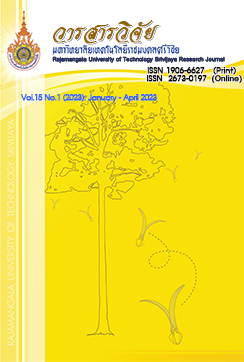Effect of Xanthan Gum and Processing on Shelf Life Extension of Karamae: Karamae Maeparkong, Phatthalung
Keywords:
Karamae, Xanthan Gum, Shelf Life Extension, Oxigen Absorber, Karamae MaeprakongAbstract
Karamae, a Thai traditional dessert, only lasts 7 to 14 days before becoming harder from retrograded and rancid starch. The purpose of this research was to examine the combined effect of xanthan gum (XN) and processing methods on the extension of Karamae’s shelf life. Karamae processing was used at two levels in a factorial 2×3 completely randomized design. The first method involved adding each ingredient one at a time while using fresh coconut milk (the standard method), and the second method involved doing the same while using boiled coconut milk sweetened with sugar. Two levels of XN content were studied at 0.25, and 0.5% of starch weight. Karamae was preserved in a nylon bag with vacuum condition and oxygen absorbers at room temperature (30 °C) for 49 days. The characteristics of all samples were determined every 7 days. The results revealed that the moisture loss of Karamae (without XN)with and without oxygen absorber dramatically decreased after a 49-day storage at 32 and 36% whereas the sample containing XN displayed a moisture loss of 4-15%. Moreover, the L* and hardness increased (p>0.05) with longer storage times in the second method using 0.5% XN. In addition, after 14 days of storage, the overall preference scores of the standard method processing of Karamae without XN and oxygen absorber significantly reduced (p≤0.05). However, the overall preference scores were lower at 28 days for both methods with 0.5% XN. The findings indicated that the standard method with 0.5% XN showed the highest overall preference scores. As a result, the shelf life of Karamae could be prolonged from 7 days to 28 days of storage time using the combination method of the second method and 0.5% XN.
References
AOAC. 2000. Official Methods of Analysis of AOAC International. 17th ed. Maryland, USA.
Attabhanyo, R., Potisate, Y., Katsri, K. and Sangsuwan, J. 2017. Processing development to extend shelf life of Kalamae. Thai Science and Technology Journal 25(1): 56-65. (in Thai)
Changso, S. 2020. Development of production process and shelf-life extension of cooked sticky rice bamboo shoot cut (Kao Lam) in Amphur Muang, Nakhon Pathom Province. VRU Research and Development Journal Science and Technology 14(2): 120-132. (in Thai)
Dechprarom, P. 2018. Kalamae Mae-Prakong Phatthalung. Interview. January 15, 2018. (in Thai)
Limsangouan, N., Prasert, W., Charunuch, C., Butsuwan, P. and Srichayet, P. 2018. Effect of storage conditions on retrogradation, physical and chemical properties changing of extruded rice and soy snack. Science and Technology Journal 26(4): 575-587. (in Thai)
Phuphechr, P., Suwonsichon, S. and Limanond, B. 2009. Chemical and physical characteristics of Sinin rice flour and qualities of Sinin rice flour substituted bread dough, pp. 20-27. In Kasetsart University Annual Conference (47th ed). Kasetsart, Bangkok. (in Thai)
Pongsawatmanit, R., Chantaro, P. and Nishinari, K. 2013. Thermal and rheological properties of tapioca starch gels with and without xanthan gum under cold storage. Journal of Food Engineering 117(3): 333-341.
Ratithammatorn, T. 2016. Effects of heating and cooling on structural change and digestion of starch. Burapha Science Journal 21(2): 246-259. (in Thai)
Seeta, W., Supavititpatana, T. and Supavititpatana, P. 2016. The reducing of starch retrogradation for wide strip rice noodle production under cold storage. Rajabhat Agriculture Journal 15(1): 27-36. (in Thai)
Sobolewska-Zielinska, J. and Fortuna, T. 2010. Retrogradation of starches and maltodextrin of origin various. Acta Scientiarum Polonorum., Technologia Alimentaria 9(1): 71-81.
Sriroth, K. and Piyachomkwan, K. 2007. Technology of Starch. 4th ed. Kasetsart University, Bangkok. (in Thai)
Wang, S., Li, C., Copeland, L., Niu, Q. and Wang, S. 2015. Starch Retrogradation: A Comprehensive Review. Comprehensive Reviews in Food Science and Food Safety 14: 568-585.
Whistler, R.L., Be Miller, J.N. and Paschall, E.F. 1984. Starch Chemistry and Technology. 2nd ed. Academic Press, London.
Zhou, Y., Wang, D., Zhang, L., Du, X. and Zhou, X. 2008. Effect of polysaccharides on gelatinization and retrogradation of wheat starch. Food Hydrocolloids 22(4): 505-512.
Downloads
Published
How to Cite
Issue
Section
License
Copyright (c) 2023 Rajamangala University of Technology Srivijaya Research Journal

This work is licensed under a Creative Commons Attribution-NonCommercial-NoDerivatives 4.0 International License.
The content and information in the article published in Journal of Rajamangala University of Technology Srivijaya It is the opinion and responsibility of the author of the article. The editorial journals do not need to agree. Or share any responsibility.







